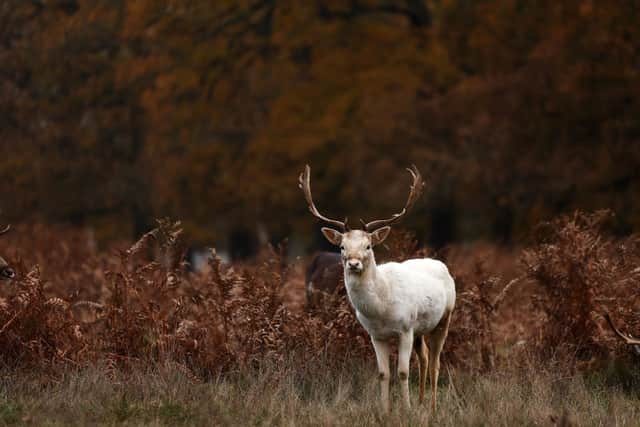Green watchdog: Government falling short of targets in 'damning' report - but thriving nature still attainable
and live on Freeview channel 276
Progress on around half of the UK's environmental goals is either standing still or moving in the wrong direction, a government watchdog says - but thriving nature and wildlife could still be within reach.
In its annual report, the Office for Environmental Protection (OEP) - set up after to UK left the EU to monitor attempts to leave the environment in a better state for the next generation - said around half the 51 trends it monitored - which include clean air and water, minimising waste, and adapting to climate change - were not improving. Of the 10 goals in the Government’s Environmental Improvement Plan, seven were 'largely off track', two are 'partially on track' and one was not assessed.
Advertisement
Hide AdAdvertisement
Hide AdOEP chair Dame Glenys Stacey told PA that overall, improvement efforts have yielded mixed results - but “deeply concerning adverse environmental trends" continued. Invasive species like grey squirrels and rhododendrons were growing in number, and causing increasing damage to local wildlife.
Meanwhile, water pollution incidents were not falling - although pipe leakages were - with the amount of hazardous waste still rising. The government was “behind the curve” on managing exposure to chemicals and pesticides, the OEP said, and it raised concerns about a lack of soil and marine monitoring - which made tracking progress difficult.


But the watchdog said government's "apex goal" of thriving plants and wildlife was still achievable if it sped and scaled up conservation and restoration efforts like nature-friendly farming. Its chief scientist added that the right tools and policies were in place, they just needed to be implemented effectively - to make sure farmers and landowners "are fully on board".
“Changing the trajectory requires determination and detailed planning, clarity and transparency, constant evaluation and a willingness to take some difficult decisions when it’s necessary," Dame Glenys said. “It means doing enough, quickly enough, to get on track and keep on track. And in reality it’s not a matter of choice. We must protect and improve the environment for all of us to thrive, knowing as we know, it’s so fundamental to our health and prosperity.”
Advertisement
Hide AdAdvertisement
Hide AdShe continued: “With the depleted state of our natural environment and the unprecedented pace of climate change, it does seem to many that we’re at a crossroads... It’s not easy for us as a nation to choose the right path, the right trajectory, to travel together and to travel together at the pace now needed, but we just simply must.”
In a statement, Environment Minister Rebecca Pow told NationalWorld that since 2010, the government has created or restored habitat the size of Dorset. In the last six months alone, it has banned single-use plastics, begun the process of creating a new national park, planted nearly 5 million trees and worked with farmers to launch 34 new landscape recovery projects, she said.
“We were always clear that our targets are ambitious, and would require significant work to achieve, but we are fully committed to creating a greener country for future generations and going further and faster to deliver for nature," Pow continued. “We will carefully review the Office for Environmental Protection’s findings and respond in due course.”
Meanwhile, environment and climate campaign groups have described the assessment as "damning". WWF's head of policy Alec Taylor said: "Clearly the government's environmental plans are too vague, too weak and too late to meet both its own commitments and the promises it made to the world last year.
Advertisement
Hide AdAdvertisement
Hide Ad"This should be a wakeup call for the government to produce a much stronger national plan for meeting the global nature goals it signed up to, and save the precious nature we all depend on," he continued. "In this election year every political party needs to up their ambition and clearly show how they will bring our world back to life."
Greenpeace UK's chief scientists Doug Parr added: "When it comes to protecting nature, this report proves beyond doubt that Rishi Sunak is all mouth and no trousers. His government has completely failed to take the bold and urgent action required to leave the environment in a better state for future generations."
Sewage was still pumped into seas where marine life remained threatened by destructive fishing, he said, while the government was "nowhere near" its promise to protect at least 30% of the UK’s land and sea by 2030. “With an election just around the corner, the prime minister will need to pull out all the stops if he’s to convince voters that nature is truly a priority for his government, but he’s rapidly running out of time.”
This comes as last year was revealed to be the hottest in world history. However, experts have already warned 2024 could be even hotter - with many scientists are calling for world leaders to urgently slash fossil fuel use to limit further warming while we still can. The UK government is currently poised to vote on a new bill which would expand oil and gas production in the North Sea, by requiring future governments to run new licencing rounds each year. The government has also been criticised over softened environmental policies in general - on the back of a devastating report revealing one in six UK species was faced with extinction.
Comment Guidelines
National World encourages reader discussion on our stories. User feedback, insights and back-and-forth exchanges add a rich layer of context to reporting. Please review our Community Guidelines before commenting.
